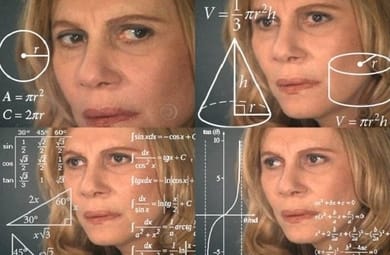Zouk Math: The Unspoken Calculus of the Dance Floor

Zouk math is something you experience more the better you are at dancing Zouk.
It’s a balance between community growth, personal enjoyment, and having people not hate you.
If you’re new to Zouk, you take what dances you can get — but in a world of loud rooms, non-verbal communication, and avoiding awkward situations, Zouk Math becomes essential.
Let’s talk about the principles behind it.
The Rule of Three
Unlike Salsa or Bachata, where you typically dance one song per person, in Zouk you usually dance three songs — or more if the connection is great, or fewer if it’s painful or just not working.
Because DJs mix tracks seamlessly, you can easily lose track of time.
An hour can disappear in what feels like a moment.
Still, three songs is the sweet spot — the guilt-free exit point.
End it at two, and there goes their smile.
End it after one, and you might need to avoid eye contact for the rest of the night. 😵
The DJ Paradox
Zouk DJs are like illusionists — the music never really stops, just morphs.
So how do you know when a dance will end?
You can’t, exactly.
But veterans read the signs: the phrasing, the shift in mood, the subtle glance that says, “one more?”
And this is where the math kicks in.
The Eye-Contact Equation
Let’s say we both know we enjoy dancing together.
If you’re standing nearby while I’m mid-dance and we make undeniable eye contact — that’s a signal.
It means I’ll probably end this dance soon so we can dance next.
But if someone else asks you before I finish, fair game.
Now, if that person happens to be a beginner, that’s likely a three-song dance, so I’ll probably go find another beginner-ish partner and also dance three songs.
That way we’ll both end around the same time and dance together after.
I’ve never actually said this out loud before — but everyone who gets it, gets it.
Why We Do It
If I don’t dance while you dance, I’m stuck waiting 10–15 minutes — either saying no to others, hiding in a corner, or looking closed off (which can make people think I’m snobby).
And this, I think, is why so many zoukers take up smoking or drinking — not necessarily because they want to, but because they need something to do while waiting.
They hate saying no, and a beer or cigarette is easier than awkward rejection.
(I'm joking… kind of.)
The 45-Minute Dance Dilemma
Sometimes the person you want to dance with gets locked into that dance — you know the one.
Forty-five minutes of pure flow, both people completely tuned in.
At that point, it’s better to let fate decide.
Waiting for them is a rookie mistake.
Move on.
Community Growth Math
There’s also the community version of Zouk Math — the charitable kind.
You give “beginner dances” on a rotational basis: weekly, bi-weekly, monthly.
For me, there’s a strong correlation between how often I dance with someone and how much they’re actively improving.
If someone’s training, studying, showing up — I make time for them.
If they’ve stopped saying hi, it’s probably because we haven’t danced in a while and they’ve given up on me.
Fair enough.
In large communities, there’s only so much time in a night.
Eventually, you have to prioritize the ones who treat the dance seriously.
The perma-beginners — the ones who don’t study or train — get deprioritized.
That’s just Zouk Math.
Arrival Time Math
Arrive early — right after the group class — and it’s beginner city for the first hour or two.
I can handle three or four charity dances in a night, but not ten in a row before I get my first “good” dance.
Don’t get me wrong, I love dancing with beginners; they keep me sharp and humble.
But sometimes I just want a partner who knows all the rules so we can break them together.
Yes, I call them charity dances because I’m giving to the less fortunate.
If you’re not in Zouk heaven and doing Zouk Math, you’re still in Zouk hell.
If You’re on the Wrong Side of the Math
If you feel like people are calculating ways to avoid dancing with you — it’s not personal.
It’s probably because you’re not training, not improving, or you’re just too sweaty and smell bad.
Fortunately, those are all fixable problems.
Put in the effort, train, show up clean and kind — and you’ll get dances.
And if you want to get good fast…
may I recommend this personalized Zouk immersion? 😉
Meta Description (for SEO)
Zouk Math is the unspoken logic of the social dance floor — how dancers balance connection, community, and survival. Here’s how it works and why it matters.